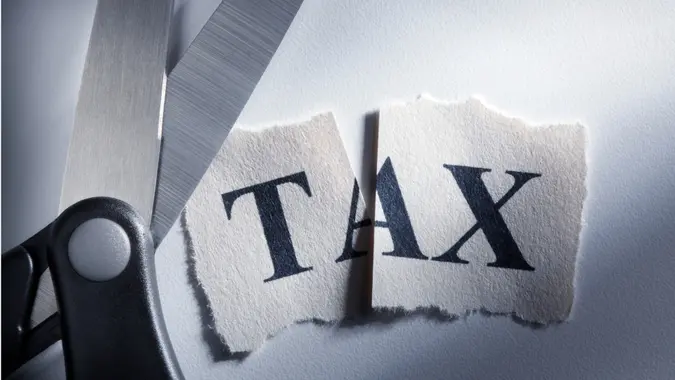I’m an Attorney: How To Plan for Estate Taxes and Minimize Their Impact

Commitment to Our Readers
GOBankingRates' editorial team is committed to bringing you unbiased reviews and information. We use data-driven methodologies to evaluate financial products and services - our reviews and ratings are not influenced by advertisers. You can read more about our editorial guidelines and our products and services review methodology.

20 Years
Helping You Live Richer

Reviewed
by Experts

Trusted by
Millions of Readers
Estate planning isn’t exactly one of the cheeriest aspects of managing your finances. Determining how you want to distribute your hard-earned resources is one thing, but finding a way to share it with your beneficiaries — without complicating their own finances — is quite another. You’ve likely been worried that your final gift to your loved ones might turn into a Trojan horse of hassle.
The good news is that there are ways to plan ahead to make sure your gift doesn’t invite more heartache. GOBankingRates connected with Asher Rubinstein — partner at Gallet Dreyer & Berkey who handles tax, trusts and estates and asset protection — to learn more about what to do.
Plan Proactively
Rubinstein said one of the biggest challenges for people during estate planning is an understandable reluctance to confront their own mortality. In fact, he has had clients with millions avoid or delay their own estate planning, even when a family inheritance was at stake and they were potentially looking at millions in taxes.
“Not acting, or delaying action, could have negative tax consequences for your heirs,” Rubinstein said. “For instance, if you take care of your estate planning in 2024 or 2025, you could get more of your estate to your family and less to the IRS. But if you wait until 2026, your family could pay more in estate taxes. This is because on Jan. 1, 2026, a lower threshold for estate tax takes effect: $7 million rather than $14 million in 2024 and 2025.”
Even a year’s delay could lead to an estate tax imposed on your family — just as they are freshly grieving you, Rubinstein pointed out.
“Acting sooner could save potentially millions in estate taxes for your family,” he said.
Be Smart About Your Assets
Rubinstein said another burden to your beneficiaries is leaving an estate that is composed of assets but little liquidity. The problem: If your heirs have to pay an estate tax, they could have trouble raising the funds to pay that tax. They might have to sell non-liquid assets like real estate, a family business, or even other investments, he added.
One of the best things you can do to avoid this scenario is to meet with an estate planning attorney to discuss strategies for lowering your estate tax.
“Discounted gifting of limited partnership or LLC membership interests is one such strategy,” he said. “Placing assets in certain types of trusts is another strategy. In addition, having life insurance in place could provide the liquidity to pay the estate tax so that your family won’t have to sell assets.”
Get Your Tax Affairs in Order
If you want to make life much easier for your beneficiaries after you’re gone, make sure you have cleared any potential tax issues. Jokes about death and taxes aside, leaving behind outstanding issues on your taxes can present a large burden for your loved ones. One example of these issues, Rubinstein said, is owning non-compliant or undeclared assets, such as a foreign bank account.
“Your heirs could inherit not only your assets but also a liability to the IRS, including the potential for an audit and penalties,” he added. “Thus, it is important to get one’s tax affairs in compliance during one’s lifetime, in order to not burden one’s survivors with an inherited tax nightmare.”
 Written by
Written by  Edited by
Edited by 


























